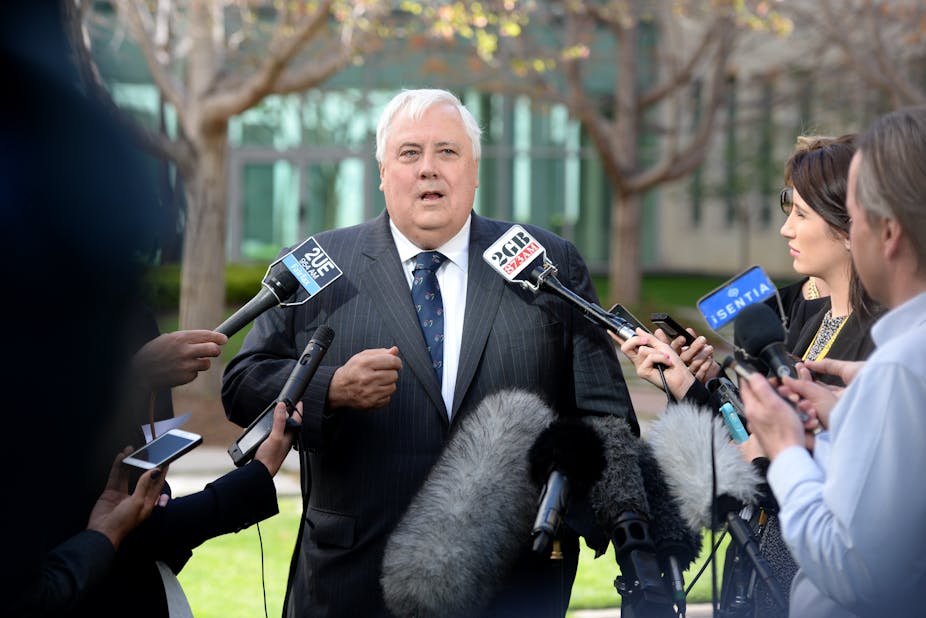The Senate has set up an extraordinarily broad inquiry into the Queensland government, in another demonstration of Clive Palmer’s power and his determination to pursue state premier Campbell Newman.
It is a bad road for the federal parliament to travel but how far it will get down it is yet to be seen. If a more limited precedent is any guide, probably not a great distance.
Palmer has a long-running feud with the Newman government, rooted in his business interests as much as in politics. This was one of the motivations for his foundation of the Palmer United Party.
He also has ambitions for PUP in next year’s Queensland election.
So the inquiry into “Certain Aspects of Queensland Government Administration related to Commonwealth Government Affairs”, to be chaired by PUP Senate leader Glenn Lazarus and reporting by March 27 is all about trying to embarrass Campbell Newman in the run up to the state poll.
PUP was able to establish the inquiry because of a change of position by the Greens.
When the Senate considered the PUP push last week the government, in an effort to head it off, moved that it also cover the previous state Labor administration. The Greens supported the amendment. After that was carried, Labor was no longer interested and the proposal hit the fence.
According to some sources, over the last few days Greens leader Christine Milne came under pressure from the environmental movement to shift on the amendment and so secure the inquiry, because the environmentalists wanted to expose the state government’s practices.
The Greens this week had PUP include a provision for the inquiry to look into the “adequacy of Commonwealth oversight of the approval of coal seam gas projects in Queensland”. The Greens argue this means the inquiry can examine the former Labor government’s coal seam gas approvals, so they could justify the about face on the Coalition’s amendment.
By Tuesday afternoon PUP had Labor and Greens support and the Senate voted 30-27 for the inquiry.
Labor was happy enough to give PUP a win so long as its own Queensland past was not under the microscope (leaving aside the Greens’ attempt to delve into history on coal seam gas). The ALP wants PUP support on other issues. Also, it stands to gain from anything that puts the Newman government under scrutiny.
The terms of reference for the inquiry (which, apart from the PUP chair, will include one government senator, two from Labor and a Green) are sweeping.
The committee is to report on Commonwealth funds paid to Queensland with reference to a number of criteria.
These include the purposes for which money was given; performance measures; identified breaches of funding agreements or conditions; the proportion of the Queensland budget derived from the Commonwealth funds; and whether any federal funds have been used by the state government for its advertising or party political purposes.
The inquiry also covers (insofar as they relate to the Commonwealth) the administration of the Queensland judicial system; approval processes for projects for resource or services exports; the extent to which Queensland practices are consistent with Australia’s international environmental obligations; whether it is appropriate for the federal environment minister to delegate his approval powers to the Queensland government under the Environment Protection and Biodiversity Conservation Act; and the extent to which Queensland practices on administering prisons and detaining without trial are consistent with Australian’s international human rights obligations.
A much more limited Senate inquiry in 1996, chaired by Labor, into the tendering process for Victoria’s Crown Casino showed the potential difficulty of such a political exercise.
The Kennett government refused to co-operate, as the Newman government will.
Much of that Senate committee’s report, appropriately titled “Compelling Evidence”, is about the barriers to getting the information from a resistant state.
The Senate clerk of the day, the late Harry Evans (not a man who usually held back in urging Senate assertiveness) advised caution.
He’d told another inquiry in 1994 that it was a parliamentary rule of the Senate that the inquiry powers were not exercised in respect of members of the House of Representatives “and as a matter of first principle the same rule extends to members of state and territory parliaments”.
“My advice to all Senate committees is that they should observe the parliamentary rule and the past practice and not seek to summon members of state or territory parliaments or state or territory officers, or to require them to give evidence or to produce documents.
"Such persons should be invited to appear or submit documents if a committee desires to take evidence from them, and any invitation to state or territory officers should be directed to the relevant state or territory minister. In the event of an invitation being declined, a committee should not take the matter any further,” Evans wrote.
The current inquiry is likely to receive similar advice, if it asks.
The 1996 committee, looking at the possible restrictions on the use of its coercive powers, concluded that current Victorian MPs could not be summoned to appear before it, and that it probably could not compel the answering of questions about the advice that had been given to the Victorian government.
In light of the problems, the committee backed off.
For the PUP inquiry to try to force the issue against an uncooperative state to the point of compulsion would require the sanction of the full Senate and possibly end up in court.

